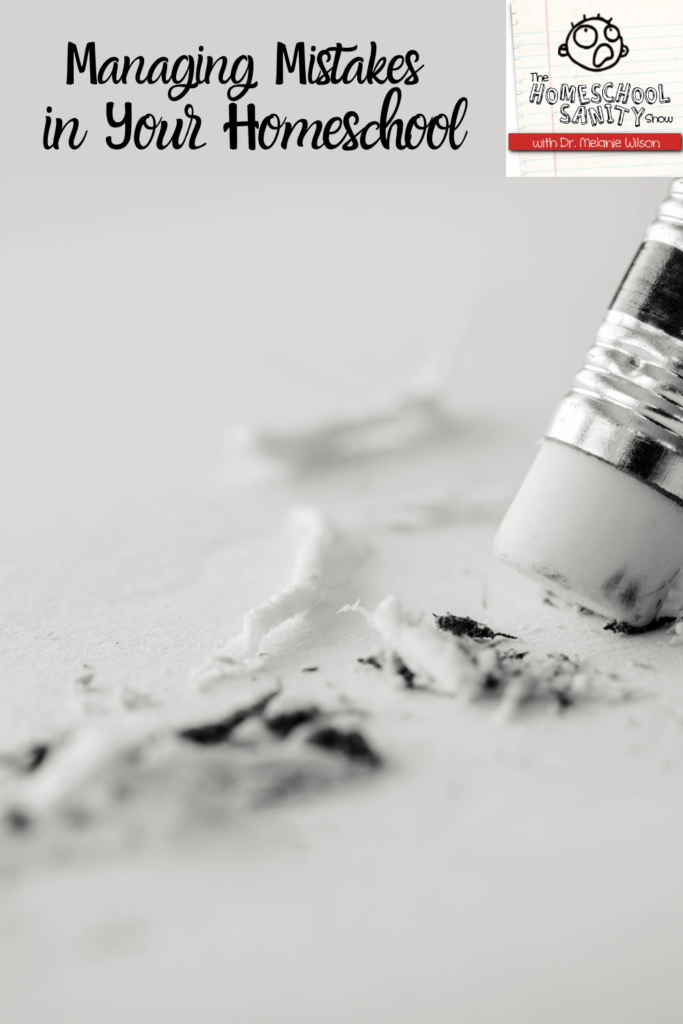I’ve been thinking a lot about mistakes in homeschooling. One reason I have is because I’ve been talking with homeschooling moms at the Great Homeschool Conventions. They’ve been asking me about their mistakes.
Another reason I’ve been thinking about mistakes this because I see the end of my homeschooling years on the horizon. My youngest is a freshman this year, and it’s hard to believe we have just a little over three years remaining. I’ve been thinking about what if anything I would do differently in my homeschooling if I had the chance.
The third reason I’ve been thinking about mistakes is because I talk to many parents of perfectionistic kids – kids who take all day to get things just right.
Grammar Galaxy
So I thought I would address the whole topics of mistakes in homeschooling. Before I dive in, I want to mention the elementary language arts curriculum I’ve authored — Grammar Galaxy. It’s story-based, explaining what happens to literature, spelling, vocabulary, grammar, and writing when the Gremlin tries to destroy the English language. Kids don’t complete boring workbooks. Instead, they complete missions as guardians of the galaxy, and put things back in order.
Grammar Galaxy is used by thousands of students across the country and even around the world. But I’m going to tell you a secret about it. It has mistakes in it. I call them Gremlins. It seems as quickly as I correct them, the Gremlin produces more to take their place. I can be a perfectionist and I found it very difficult to publish a curriculum, knowing it wasn’t perfect. But if I had waited for perfection, I wouldn’t have written a curriculum kids and parents alike enjoy. And I wouldn’t have been living my dream of writing these past five years.
With that context, I want to frame today’s topic of managing mistakes in terms of do’s and don’ts. First, three don’ts.
The first don’t is don’t overreact.
Overreacting is definitely something I have done in my homeschooling. I have put way too much emphasis on getting it right. When my kids have made mistakes, I have honestly freaked out at times. In fact, when I was crying about my college boys’ choices, one of them wisely said, “I really think this is the best time of your life to make mistakes.” I’m so glad my parents didn’t overreact to my bad choices. I think that’s because my parents’ generation didn’t think that their parenting or their kids’ choices were going to set the future in stone. That’s what the experts tell us today and it’s made homeschooling very challenging.
When my first child took the standard achievement test in sixth grade, I was concerned by his low math scores. My temptation was to think that I had failed him in teaching math and that there was little hope he would recover. I was tempted to overreact. Now I laugh at that because he went on to do honors math courses in high school, getting AP credit for advanced calculus. Even though I had serious concerns about his mistakes on the math portion of the SAT, I did not freak out. I did not get him a math tutor. I did not search for a whole new math curriculum. In fact, we kept using what we had. We don’t want to overreact to our kids’ mistakes because they do not determine the future.
The second don’t with mistakes is don’t blame yourself.
This don’t I have been guilty of for most of my years as a mom. Not only am I homeschooling mom who is supposed to be training her kids spiritually and educationally but I am a psychologist. I feel the pressure to produce good results. I know many people are watching. I am blessed that I do not have homeschool haters in my personal life to make that pressure even greater. Even so, I feel responsible for my kids’ academic and life performance. But I should not.
In fact, as I take responsibility for my kids’ mistakes, I teach them that they are not responsible. I encourage them to lay the blame at my feet. If I keep taking responsibility and my college son doesn’t study for his algebra test in college and gets a failing grade, I encourage him to complain about the algebra curriculum we used in our homeschool.
I have said this before and I’m going to keep saying it as a reminder for myself and for you: God does not hold us accountable for results. If our kids make mistakes willingly and in spite of our training and our rules, we are not responsible. Our kids (even at younger ages) have free will and will make mistakes. In fact, the more we try to keep our kids from making mistakes the more likely our strong-willed kids will make heaps of them. We are only responsible for training, coaching, and praying. The second don’t is don’t take responsibility for your kids’ mistakes.
The third don’t with mistakes is don’t give up.
Just because our child keeps making the same foolish mistakes with siblings or keeps getting long division problems wrong or keeps failing to capitalize the first letter of a sentence, we do not give up. Our kids are in a chrysalis in our home. Each day we fail to see them stretch their wings, we wonder if they would be better off if we cracked open that chrysalis and put them in school. We wonder if they need a different teacher. We wonder if we have a child who will just never get it.
Recently, a friend of mine asked me about a family member who was ready to give up on something big. She asked me for advice and I remembered the story of Florence Chadwick, who in 1952, decided to take on the challenge of swimming 26 miles between the California coastline and Catalina Island. After 15 hours of swimming, a thick fog settled in. Her team, including her mother, encouraged her to keep going even though she was exhausted. But after an hour, she called it quits. They pulled her into the boat. Later she learned she was just one mile away from Catalina Island. Had she known how close she was, she would have dug deep for the energy she needed to finish her race.
You and I can feel like the fog has settled over our homeschools. We don’t see the finish line. We don’t even see any progress. But we must keep swimming. Before we know it, we will have landed at the end and we will be grateful we persevered.
Now that we’ve covered the don’ts, let’s end with the do’s of addressing mistakes in your homeschool.
The first do is do see mistakes as progress.
It sounds cliché, but we really do learn more from our mistakes than we do when we get it right. In fact, learning isn’t getting lucky and doing it correctly the first time. Learning is pushing ourselves to the point where we make mistakes. That’s when new neural connections form in our brains. That’s when we have a new understanding of the process. And that’s when we realize we can’t do it in our own strength. We must turn to God in dependence on Him.
Thomas Edison allegedly said, “I have not failed. I’ve just found 10,000 ways that won’t work.” Making mistakes gets us closer to the right answer, the right choice, the right path. Michael Jordan said, “I have missed more than 9,000 shots in my career. I have lost almost 300 games. On 26 occasions I have been entrusted to take the game winning shot, and I missed. I have failed over and over and over again in my life. And that is why I succeed.”
One of the best lessons we can teach our kids about mistakes is that they are forward progress.
The second do with respect to homeschool mistakes is to talk to your kids about your mistakes.
I’m not suggesting that you reveal all the bad judgment you had as a young person. That can come back to bite you. But I am suggesting that we talk about our mistakes and what we’ve learned from them.
I’ve never forgotten the story about one of my mother’s mistakes. She worked for a photographer as a teen. She was sorting professional portraits when my mother picked up a photo and asked her coworker if she had ever seen an uglier boy. Her coworker said, “That’s my brother.”
My mother could have said, “Don’t say unkind things” and the impact would have been minimal. But I remember the photo story.
We can talk about our struggles with particular school subjects and how we persevered. My kids know I had a hard time with long division, geometry, and personal finance–practically speaking. I think these struggles have made me a better, more empathic teacher.
We can use our mistakes as a powerful teaching tool with our kids.
The final do with respect to homeschooling mistakes is to teach kids how to correct their mistakes.
It’s a trap we all fall into of saying no and don’t without teaching the correct alternative. “Don’t talk to your brother that way” without saying, “Tell your brother what’s bothering you with the assertiveness formula.” We correct the worksheet without making sure our kids know why their answer is wrong. And we don’t give kids a chance to retest or rewrite. It’s in this process of practicing the right things that the most learning takes place.
One discipline strategy I used when my kids were younger was making them repeat the right behavior several times. So, they left items on the stairs as they went up? I would have them come back and take them up three times.
Another strategy is to have kids make reparations. If they cost you time with bad behavior, they make up for it by doing some of your work. They write an apology letter, explaining what they should have said or done. They write the positive statements they should have made to fill a page. Doorposts has an excellent resource for helping kids respond to mistakes from a biblical perspective.
Use mistakes as an opportunity to teach kids the right way to do things.
Conclusion
I want to review the do’s and end with the don’ts. Do teach kids that mistakes are progress. Do discuss your own mistakes with them. Do teach kids the right behavior in response to mistakes. And don’t overreact or blame yourself for your kids’ mistakes. And most importantly, don’t give up–not because of mistakes anyway. Florence Chadwick would tell us to just keep swimming.
If you’d like to try Grammar Galaxy for free, go to FuntoLearnBooks.com/samples.







